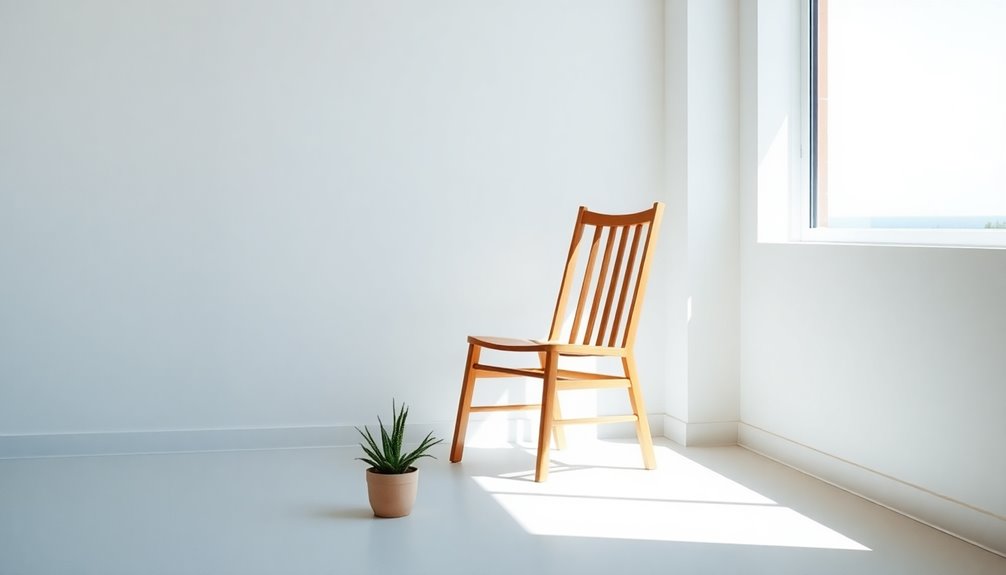Minimalism is about stripping away the unnecessary to focus on what truly enriches your life. It encourages intentional living, aligning your possessions and choices with your values. By simplifying, you'll find mental clarity, reduce stress, and foster deeper relationships and experiences over material accumulation. Embracing minimalism also connects you to a broader cultural heritage that values simplicity and mindfulness. Discovering how to implement these principles can lead to a more fulfilling life and a deeper sense of purpose.
Key Takeaways
- Minimalism encourages intentional living by focusing on what truly matters and aligning possessions with personal values and purpose.
- Embracing simplicity leads to mental clarity, reduced stress, and a deeper appreciation for relationships and experiences over material accumulation.
- Historical philosophies like Stoicism and Buddhism emphasize non-attachment and virtue, reinforcing the timeless appeal of minimalism across cultures.
- Modern minimalism counters consumerism by promoting decluttering, digital minimalism, and sustainable living for a healthier planet.
- Practical steps, such as journaling and community support, empower individuals to prioritize meaningful experiences and embrace a simpler, more fulfilling life.
Understanding the Essence of Minimalism
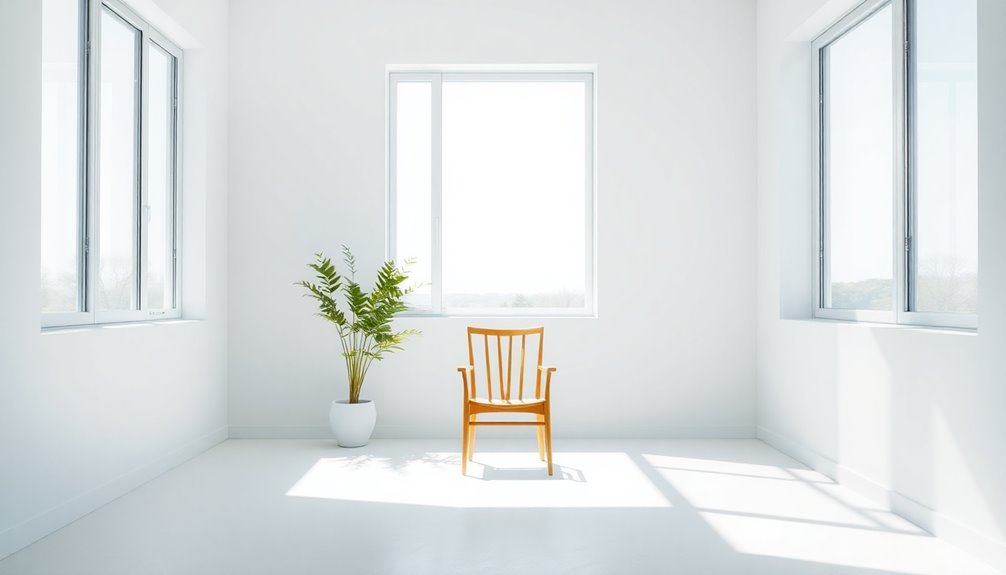
Minimalism isn't just about decluttering your space; it's a way to embrace intentional living. By adopting a minimalist lifestyle, you focus on what truly matters, aligning your possessions with your personal values and purpose.
This philosophy encourages you to reflect on your consumer habits, helping you recognize that relationships and experiences often outweigh material goods. When you simplify your life, you gain mental clarity and reduce stress, enhancing your overall well-being.
Prioritizing quality over quantity allows you to make thoughtful choices about your belongings, fostering a more meaningful life. Through mindfulness and living with less, you uncover greater appreciation for life's true joys, empowering yourself towards personal growth and freedom. Additionally, embracing a minimalist approach is akin to adopting energy-efficient systems, which can lead to both financial savings and a reduced environmental footprint.
Minimalism transforms your perspective, allowing you to thrive in simplicity.
The Historical Roots of Minimalist Philosophy
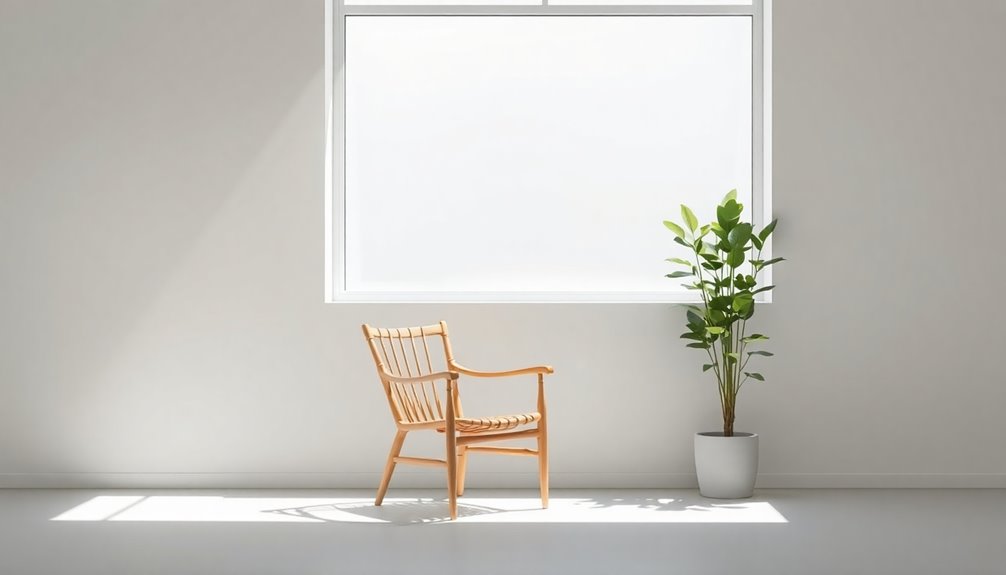
When you explore the historical roots of minimalist philosophy, you'll find influences from ancient traditions like Stoicism and Buddhism. These philosophies teach that simplicity and non-attachment can lead to a more fulfilling life. Understanding these cultural perspectives helps you appreciate minimalism as a powerful counter to today's consumer-driven world. Additionally, minimalist principles can enhance personalized learning by promoting focus and clarity in educational environments.
Ancient Philosophical Influences
Throughout history, various philosophical teachings have shaped our understanding of simplicity and minimalism. Ancient philosophical teachings, particularly from Stoicism and Buddhism, highlight the importance of non-attachment and the pursuit of a fulfilling life.
Consider these key influences:
- Stoicism teaches that true happiness comes from virtue and wisdom, not possessions.
- Buddhism emphasizes non-attachment, encouraging you to release material cravings for inner peace.
- Epicurus promotes simple pleasures like friendship and contemplation, aligning with minimalist values.
These philosophies not only provide insights into living simply but also encourage a mindful approach to life, paving the way for modern minimalist thought. The historical context of various cultures, such as the importance of butter in ancient societies, illustrates how simplicity can manifest in both daily sustenance and broader economic practices.
Embracing these teachings can inspire you to cultivate simplicity in your everyday existence.
Historical Practices of Simplicity
While many modern interpretations of minimalism draw from recent trends, the historical practices of simplicity offer deeper insights that resonate with enduring human values.
Ancient philosophies like Stoicism and Taoism emphasized minimalist living, teaching that true happiness stems from virtue and wisdom rather than material wealth. The Stoics encouraged moderation and self-control, while Taoism urged you to align with nature and eliminate excess desires.
Historical figures like Henry David Thoreau embodied these principles, advocating for self-sufficiency and a connection with the environment during his time at Walden Pond.
Additionally, cultures such as the Japanese Zen tradition have long embraced simplicity, fostering peace and mindfulness through uncluttered spaces and intentional living. These practices remind you of the profound benefits of a simpler life, including the importance of emotional expression as a means to enhance well-being.
Cultural Perspectives on Minimalism
Minimalism isn't just a modern trend; it's deeply rooted in various cultural philosophies that have shaped human experience for centuries.
By exploring these cultural perspectives, you can gain insight into the timeless appeal of minimalism:
- Stoicism and Buddhism emphasize simplicity and mindfulness, urging you to reduce desires for clarity and peace.
- Wabi-Sabi in Japan celebrates beauty in imperfection, encouraging an appreciation for life's natural cycles.
- Hygge from Scandinavia prioritizes comfort and meaningful connections over material excess.
These historical roots show that minimalism isn't merely about decluttering; it's a way to live more intentionally, fostering deeper connections with yourself and the world around you. Additionally, embracing concepts like intentional living can further enhance your journey toward simplicity and fulfillment.
Embracing these principles can inspire a simpler, more fulfilling life.
The Modern Resurgence of Minimalism
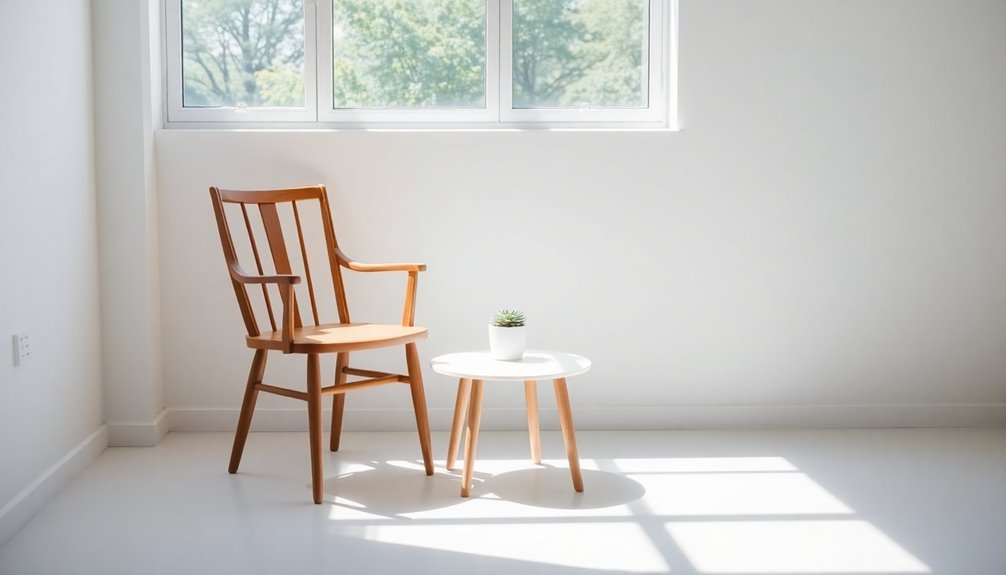
In today's digital age, you might feel overwhelmed by constant advertisements and the pressure to consume. This growing discomfort has sparked a movement toward minimalism, where simplifying your life becomes a powerful response to consumerism. As people seek tranquility, they are increasingly drawn to energy-efficient designs that promote a greener lifestyle and reduce clutter in their living spaces.
Digital Age Influence
As the digital age bombards you with constant notifications and endless consumer choices, many people are turning to minimalism as a remedy for the chaos.
The overwhelming nature of consumerism and digital distractions drives you to seek simplicity and clarity in your life. Embracing digital minimalism can help you cut through excess material and focus on what truly matters.
Consider:
- Reducing your app usage and decluttering your devices
- Limiting social media time to foster real-life connections
- Prioritizing experiences over accumulating possessions
Additionally, the rise of AI-driven personalization in various sectors highlights the importance of curating what you consume and ensuring it aligns with your values and needs.
Reaction Against Consumerism
Amidst the clutter and chaos of modern consumerism, a powerful movement is emerging, urging you to reconsider what truly enriches your life. The modern resurgence of minimalism is a reaction against material excess, encouraging you to embrace a simple life by owning fewer possessions.
This shift is evident, with nearly 78% of people expressing a desire to declutter, revealing a collective yearning for clarity amidst the distractions of consumer culture. Social media plays a pivotal role, showcasing influencers who advocate for intentional living and sharing their transformative journeys.
Research highlights that those who adopt minimalist principles experience enhanced well-being, reduced stress, and a deeper connection to sustainability, fostering a healthier planet while prioritizing personal fulfillment. Additionally, advance directives can provide clarity in decision-making processes, further enhancing the simplicity and intentionality of one's life choices.
Minimalism as a Response to Consumerism
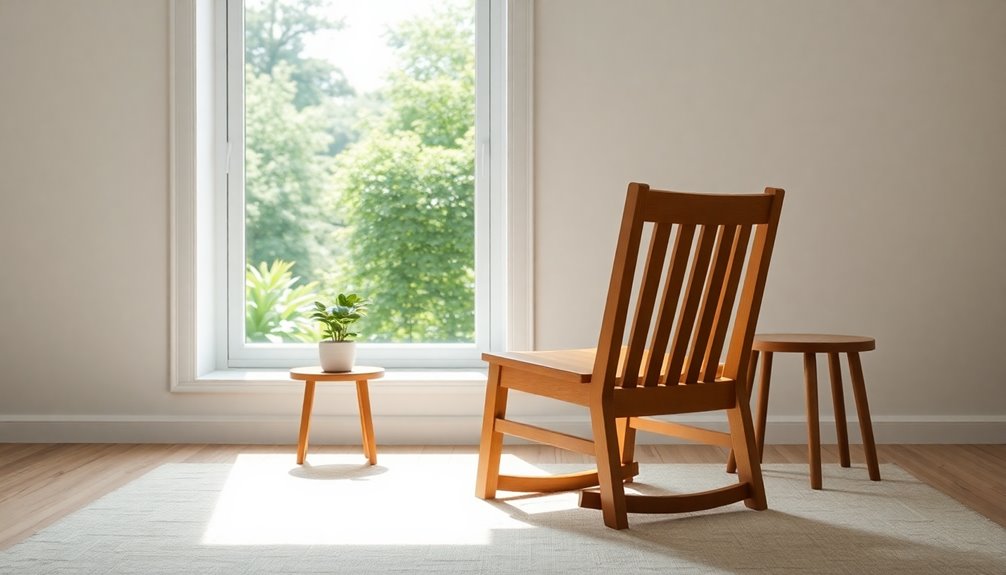
While many believe happiness comes from accumulating more, minimalism challenges this notion by advocating for a life focused on experiences and relationships rather than material possessions.
As a response to rampant consumerism, minimalism encourages you to declutter your life and prioritize what truly matters.
Consider these key aspects of minimalism:
- Conscious consumption: You focus on meaningful purchases, avoiding impulsive buys.
- Gratitude: You learn to appreciate existing possessions instead of yearning for more.
- Intentional living: You embrace fewer, high-quality items that enhance your life. Butter is a source of vitamins that can contribute to a balanced diet when consumed mindfully.
The Psychological Benefits of Minimalist Living
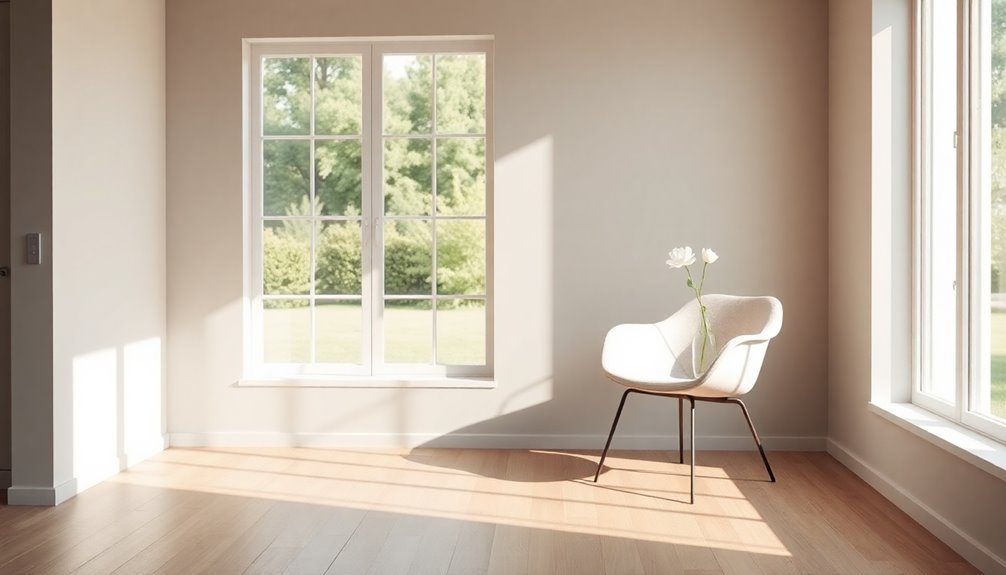
Living minimally can greatly reduce mental clutter, helping you feel more at ease and focused.
By clearing away distractions, you'll likely notice an improvement in your emotional well-being, allowing for deeper connections with others.
Embracing this lifestyle can lead to a more intentional and fulfilling life. Additionally, adopting a minimalist approach can enhance your emotional regulation, which is essential for managing emotional responses and improving interpersonal relationships.
Reduced Mental Clutter
When you embrace minimalist living, you can considerably reduce mental clutter, leading to a more focused and serene mindset.
A simplified environment not only enhances your mental health but also creates space for what truly matters. Research shows that decluttering correlates with reduced stress and increased happiness.
Here are a few benefits you might experience:
- Improved decision-making by prioritizing essential tasks and possessions.
- Heightened mindfulness, allowing you to engage deeply in the present moment.
- Greater overall life satisfaction, as you appreciate non-material aspects of existence.
Enhanced Emotional Well-being
Embracing a minimalist lifestyle not only clears mental clutter, but it also paves the way for enhanced emotional well-being.
By reducing distractions and simplifying your surroundings, you can markedly lower stress levels and anxiety, leading to improved mental health.
Minimalism encourages you to focus on experiences over material possessions, fostering deeper connections with family and friends. This shift creates more time for meaningful interactions, enhancing your emotional fulfillment.
Additionally, as you engage in self-reflection, you'll gain clarity on your values and priorities, driving personal growth.
The sense of accomplishment that comes from increased focus and productivity contributes to a greater overall sense of happiness and life satisfaction, making minimalism a powerful tool for emotional well-being.
Cultivating Intentionality in Your Life
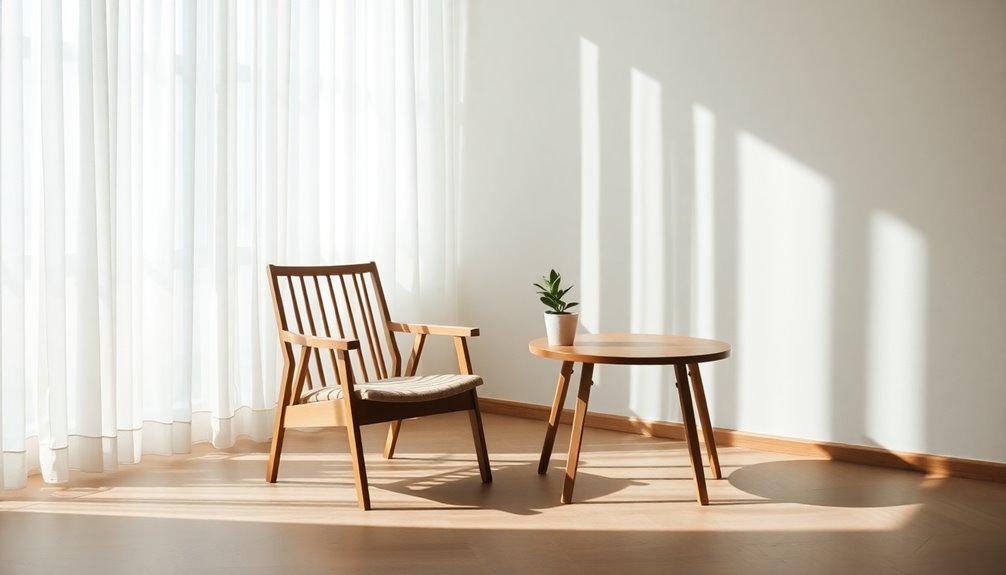
Cultivating intentionality in your life means actively evaluating your personal values and passions to make choices that resonate with your true self.
By practicing intentional living, you prioritize experiences over material possessions, deepening your relationships and enhancing fulfillment. Embracing minimalism encourages you to reflect on what you truly need, reducing impulse buying and financial strain.
Here are three practical ways to cultivate intentionality:
- Engage in regular self-reflection to identify distractions and clutter.
- Assess your purchases by asking if they align with your values.
- Focus on nurturing relationships that bring joy and meaning.
Minimalism and the Pursuit of Meaningful Experiences
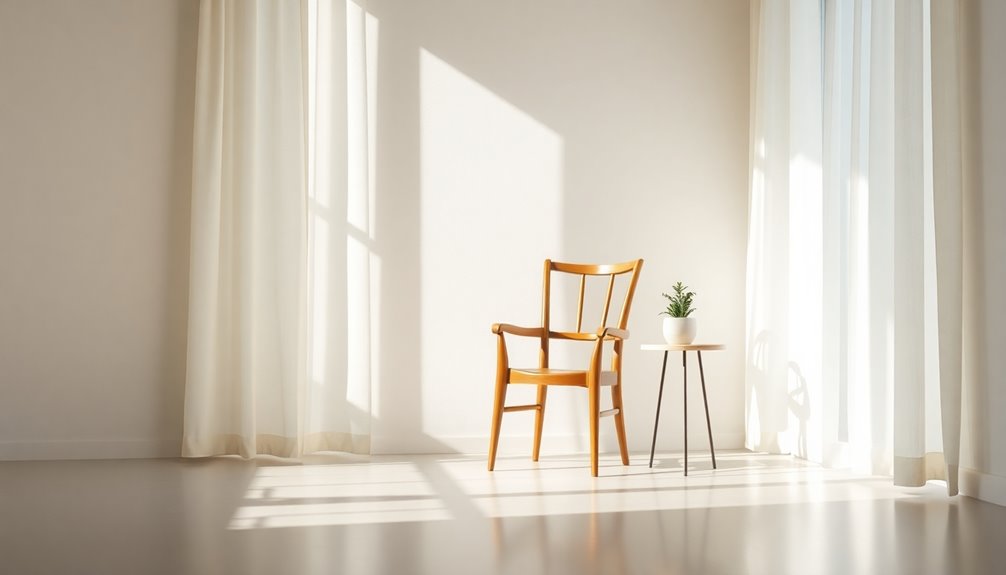
How can minimalism transform your approach to life's experiences? By embracing simple living, you can prioritize meaningful experiences over material possessions.
Studies show that experiences bring more lasting joy than physical items, leading to greater life satisfaction and happiness. When you reduce distractions from excess belongings, you free up time and energy to nurture relationships and engage in fulfilling activities.
This heightened awareness of your personal values empowers you to make intentional choices that align with your passions and long-term goals. Ultimately, minimalism teaches that true wealth comes from rich experiences, fostering deeper personal growth and fulfillment.
Practical Steps to Embrace Minimalism

Experiencing life more fully often starts with a shift in how you manage your surroundings.
A deeper experience of life begins with transforming how you organize and interact with your environment.
To embrace minimalism, consider these practical steps:
- Declutter one area at a time, removing things that don't serve a purpose or bring you joy, reducing mental and physical clutter.
- Apply the "one in, one out" rule: for every new item you bring home, donate or discard one, promoting conscious consumption.
- Keep a journal to reflect on your values, helping you align your life with what truly matters.
Overcoming Challenges in Minimalist Living
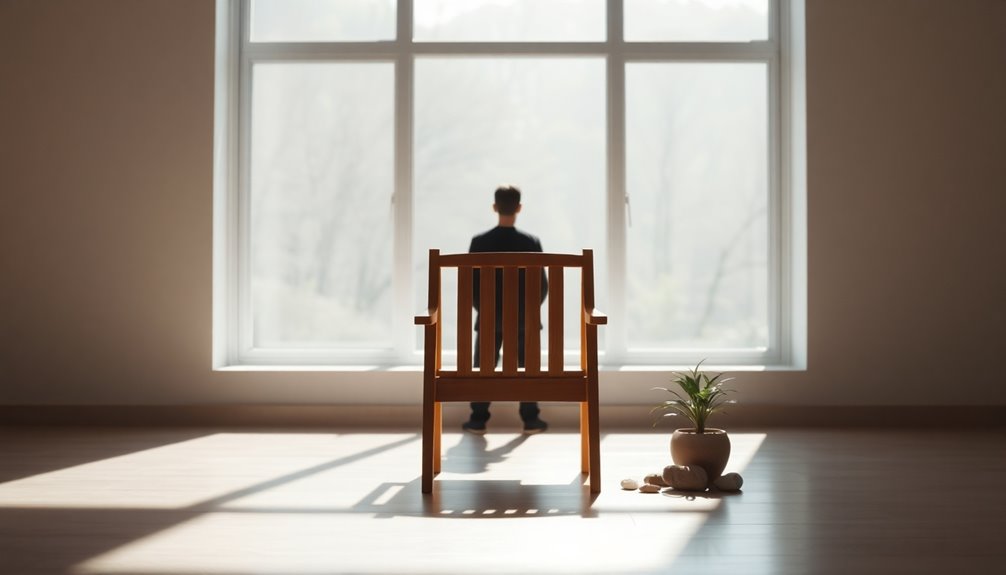
While embracing minimalism can lead to a more fulfilling life, overcoming the challenges that come with it often requires a shift in mindset. You'll need to prioritize experiences and relationships over material possessions. Practicing mindfulness helps you reflect on what truly brings joy.
Here's a quick guide to tackle common challenges:
| Challenge | Solution |
|---|---|
| Emotional attachment to items | Reflect on true value |
| Pressure to acquire more | Embrace conscious consumption |
| Overwhelming decluttering | Set small, achievable goals |
| Lack of motivation | Build a supportive community |
| Difficulty in prioritizing | Focus on meaningful relationships |
Real-Life Stories of Minimalism Transformations
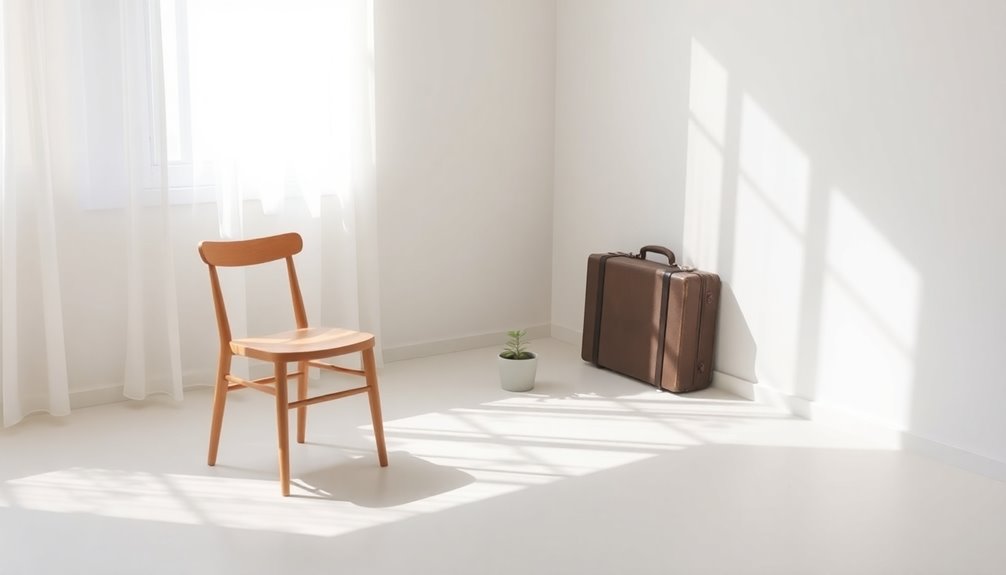
Embracing minimalism often leads to profound transformations, as countless individuals have discovered through their personal journeys.
They've found that living with less allows them to focus on things that really matter. Here are some inspiring changes reported:
- Stress levels drop, enabling deeper connections with loved ones.
- Decluttering leads to a renewed sense of purpose and clarity.
- Financial benefits arise as individuals prioritize needs over wants.
For instance, one woman shared how simplifying her home improved her mental health, allowing her to enjoy painting and volunteering.
Meanwhile, a family blogged about their shift, highlighting stronger ties and an overall better quality of life.
These real-life stories showcase the beautiful impact of minimalism on everyday living.
Frequently Asked Questions
What Is the Philosophy Behind Minimalism?
The philosophy behind minimalism encourages you to focus on what's truly essential in your life.
It urges you to prioritize experiences and relationships over material possessions, helping you find clarity and purpose.
By reducing distractions and letting go of unnecessary items, you create space for mindfulness and emotional freedom.
This approach challenges societal norms around consumerism, allowing you to cultivate a more intentional and fulfilling life that aligns with your personal values.
What Is the Concept of Minimalism in Life?
In a world overflowing with distractions, minimalism stands as a beacon of clarity.
It's about stripping away the excess—both physical and mental—to focus on what truly matters to you.
You'll find freedom in letting go of unnecessary possessions, allowing room for meaningful experiences.
What Is the Minimalist Approach Theory?
The minimalist approach theory encourages you to simplify your life by reducing excess possessions and distractions.
It pushes you to focus on what truly matters, promoting intentional living.
You'll find that self-reflection helps you recognize consumer habits, allowing you to eliminate unnecessary purchases.
What Is the Paradox of Minimalism?
Imagine standing in a sunlit room, surrounded by just a few cherished items, yet feeling richer than ever.
The paradox of minimalism hits here: by shedding possessions, you might find deeper fulfillment, contradicting the belief that more stuff equals happiness.
However, as you chase simplicity, you could feel pressured to meet strict standards, leading to guilt.
It's a delicate dance between finding freedom and becoming trapped in the very ideals you sought to escape.
Conclusion
In a world where the average American home contains over 300,000 items, embracing minimalism can feel liberating. By shedding excess, you open up space for what truly matters—experiences, relationships, and personal growth. Adopting a minimalist lifestyle isn't just about decluttering; it's a journey toward deeper fulfillment. So, why not start today? Take small steps toward simplicity, and watch how your life transforms into a more meaningful and intentional experience.
